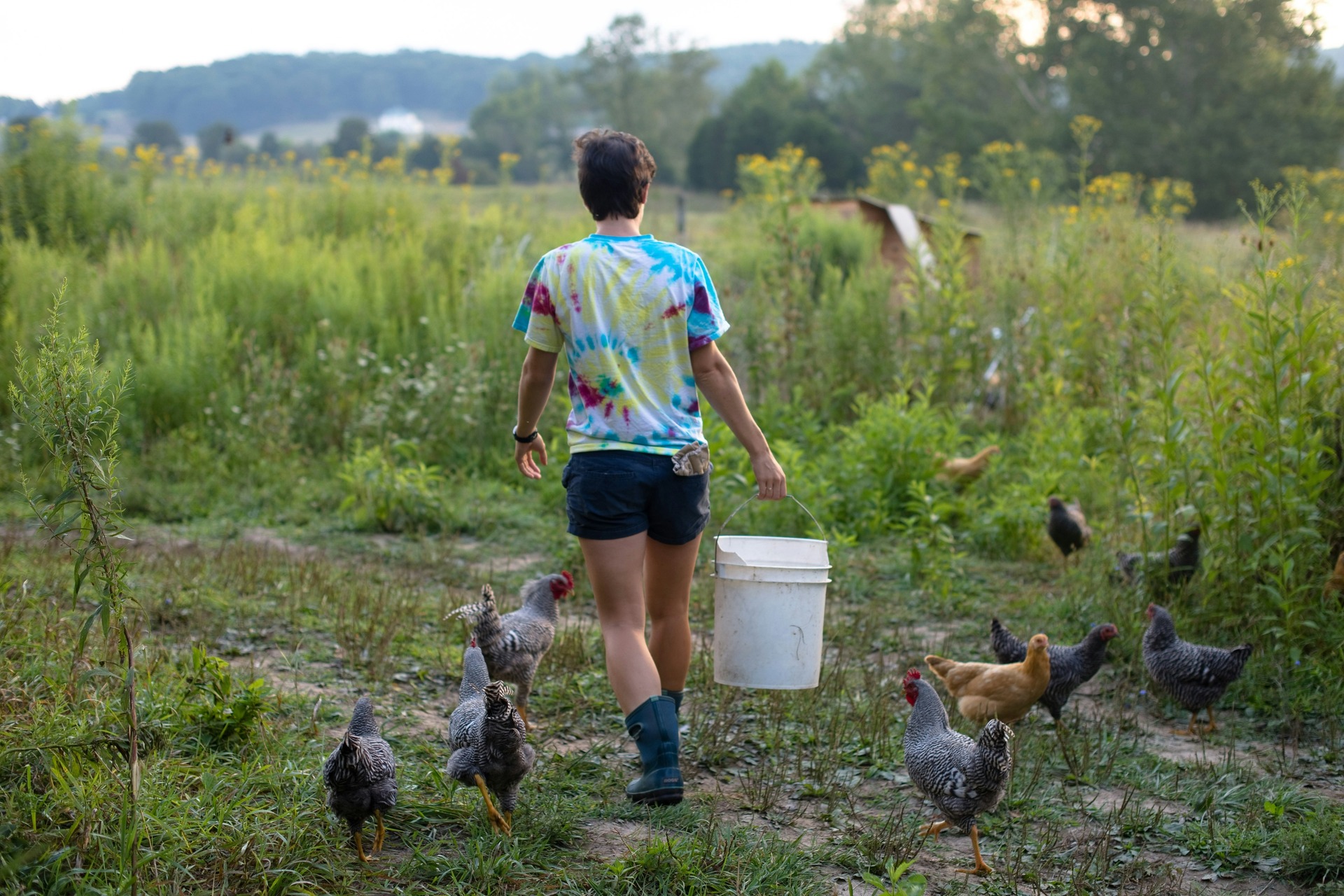
Backyard Chickens 101: Fresh Eggs Daily for Tasty Home Cooking
We are reader-supported. When you buy through links on our site, we may earn affiliate commission.
Raising backyard chickens is a delightful and rewarding venture for many homeowners. It’s about nurturing chickens in your backyard to get a steady supply of fresh eggs. This practice has gained popularity as people seek more sustainable and self-sufficient lifestyles.
The primary benefit is access to fresh, nutritious eggs that are often richer in flavor and quality than store-bought ones. These eggs can transform your home cooking, offering a fresher, organic ingredient from your garden.
Whether baking fluffy cakes or cooking hearty breakfasts, these eggs can elevate the taste and nutritional value of your meals, making the experience of raising backyard chickens a fruitful addition to your culinary adventures.
Getting Started with Backyard Chickens
Before starting with backyard chickens, it’s essential to consider a few factors. For instance, they need adequate space for health and happiness. Typically, each chicken requires about three to four square feet of coop space and eight to 10 square feet in a run or outdoor area. Assess your backyard size to determine how many chickens you can comfortably accommodate.
Moreover, check your local laws and regulations regarding backyard chickens. Some areas restrict the number of chickens you can keep, and roosters may be prohibited due to noise. It’s essential to comply with these regulations to avoid legal issues.
Raising chickens requires daily commitment. They need feeding, water and their living spaces cleaned regularly. Consider whether you have the time and willingness to provide consistent care. When choosing chicken breeds for egg production, consider the following:
- Egg production rate: Some breeds — like Leghorns and Rhode Island Reds — are known for high egg production.
- Climate suitability: Choose breeds that can thrive in your local climate.
- Temperament: Some breeds are more docile and suitable for families.
When setting up your coop, ensure it’s predator-proof, well-ventilated and insulated for weather changes. Include nesting boxes for egg-laying and perches for sleeping. In addition, guarantee a run or an enclosed outdoor area where your chickens can roam safely.
It should protect from predators and allow space for natural behaviors like scratching and pecking. In addition, include feeders, waterers and a dust bath area in the run for chicken health and hygiene.
Daily Care and Maintenance
Caring for backyard chickens daily is vital to their health and your success in egg production. Here are essential daily routines — from feeding to coop maintenance — that will keep your chickens thriving.
Feeding
Feeding your chickens the proper diet is crucial for their health and optimal egg production. A balanced diet for chickens typically includes a commercial layer feed, which provides all the necessary nutrients and minerals — especially calcium — for strong eggshells.
In addition to layer feed, you can offer various kitchen scraps — like fruits, vegetables and grains — for added nutrients. However, avoiding toxic food like chocolate, avocado and onion is essential.
Moreover, providing grit helps chickens digest their food, and a constant fresh water supply is essential for their overall health. This well-rounded diet ensures your chickens stay healthy and productive in laying eggs.
Cleaning
Maintaining cleanliness in the coop and run area is vital for your chickens’ health and preventing the spread of germs that can cause human illnesses. Germs from poultry can lead to various health issues, from minor skin infections to potentially fatal diseases.
Regular coop cleaning involves removing waste, changing bedding and disinfecting surfaces. It’s essential to keep the run area free of excessive waste and ensure it has proper drainage to prevent muddy conditions, which can harbor bacteria.
Implementing these hygiene practices reduces the risk of diseases spreading from chickens to humans, ensuring a safe and healthy environment for your family and your feathered friends.
Health Checks
Identifying and addressing common health issues in chickens is crucial to their care. Common problems include respiratory infections, parasites — like mites and lice — and digestive issues. Signs to watch include changes in eating or drinking habits, lethargy, abnormal droppings and visible parasites on their bodies or in the coop.
It’s essential to treat any health concerns promptly. It might involve cleaning the coop more thoroughly to eliminate parasites, isolating sick chickens to prevent the spreading of illness or administering medications.
Additionally, an often-overlooked aspect of chicken care is the annual vet visit. Like pets, chickens benefit from a yearly check-up to ensure they are healthy and catch any issues early. A vet specialized in poultry can provide tailored advice and health care, helping your chickens live longer, healthier lives. This proactive approach to health maintains a thriving backyard flock.
Understanding the Egg-Laying Process
The egg-laying cycle of chickens is a fascinating process. Typically, a hen will lay one egg every 24 to 26 hours, with a brief rest period after a sequence of laying. Several factors influence this cycle.
For instance, chickens need about 14 to 16 hours of daylight to maintain consistent egg production. In shorter daylight months, supplemental light in the coop can help keep egg production.
Moreover, a balanced diet is crucial. Layer feed is designed explicitly for egg-laying hens, providing the necessary nutrients. Regularly feeding hens crushed oyster shells is a great practice, as it supplies them with calcium, essential for maintaining healthy bones and producing eggs with strong shells.
To ensure a steady supply of eggs, maintain these conditions as consistently as possible. Understanding and managing these factors allows you to enjoy a regular and healthy egg supply from your backyard chickens.
Advanced Tips for Enthusiastic Chicken Keepers
Breeding your chickens can be a rewarding way to achieve specific egg qualities. For instance, you might aim for larger eggs, different shell colors or improved egg-laying frequency. Selective breeding involves choosing hens and roosters with the desired traits and monitoring their offspring’s performance. It requires patience and a good understanding of chicken genetics.
Moreover, managing a larger flock requires more organization and resources. Maintaining the space ratio per chicken is crucial to prevent overcrowding, which can lead to health issues and reduced egg production.
Efficient feeding, health management and maintaining order among the flock are imperative. Automated systems for feeding and egg collection can be beneficial in managing larger flocks.
The Joy of Raising Backyard Chickens
If you’ve been considering starting your backyard chicken journey, there’s no better time than now. Raising chickens is rewarding and a fun educational experience. Imagine the joy of collecting fresh eggs from your backyard, knowing they come from chickens you’ve cared for and nurtured.
Plus, you’ll join a community of like-minded enthusiasts who can offer support and advice. So, leap into this exciting venture and enjoy the unique satisfaction of raising your flock.
Share on
Like what you read? Join other Environment.co readers!
Get the latest updates on our planet by subscribing to the Environment.co newsletter!
About the author

Steve Russell
Steve is the Managing Editor of Environment.co and regularly contributes articles related to wildlife, biodiversity, and recycling. His passions include wildlife photography and bird watching.





